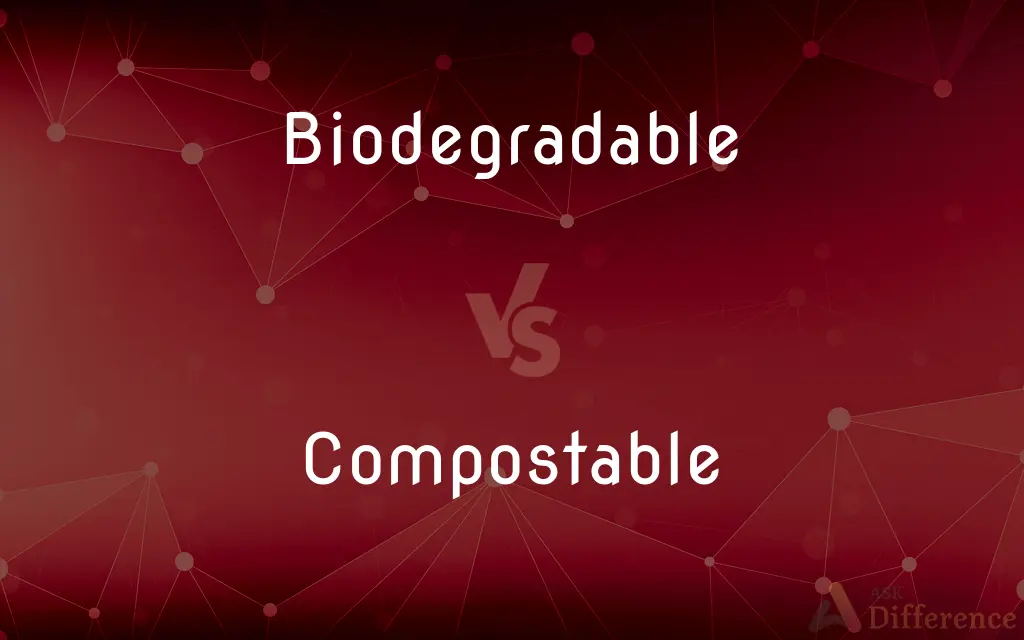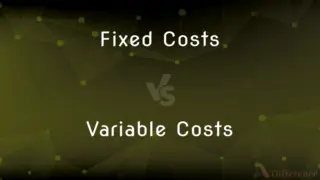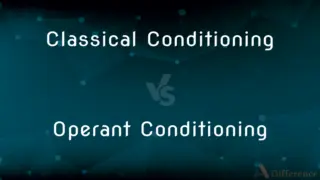Biodegradable vs. Compostable — What's the Difference?
By Tayyaba Rehman & Fiza Rafique — Published on September 26, 2023
Biodegradable materials break down naturally over time, often leaving behind toxins. Compostable materials not only break down but also provide nutrients to the soil, typically within a composting environment.

Difference Between Biodegradable and Compostable
Table of Contents
ADVERTISEMENT
Key Differences
Biodegradable products are designed to break down naturally in the environment, often through the action of microorganisms, fungi, or bacteria. Compostable products, on the other hand, not only break down but also disintegrate into non-toxic substances, enriching the soil with nutrients.
While Biodegradable products can break down in any natural environment, the term does not specify a timeframe for this decomposition. Compostable products usually have a designated timeframe under which they break down, often in a composting facility designed to accelerate the process.
Biodegradable items may leave behind residue or toxins that are not beneficial to the soil or environment. Compostable items are designed to break down into beneficial compounds like water, carbon dioxide, and biomass, which are environmentally friendly and enrich the soil.
Biodegradable products can be processed in landfill environments, while compostable products ideally require special composting conditions. Compostable items need specific levels of heat, water, and aeration to break down completely, which are conditions often found in industrial composting facilities.
Comparison Chart
Decomposition Process
Breaks down naturally
Breaks down into soil-enriching substances
ADVERTISEMENT
Timeframe
Not specified
Specified, usually quicker
Residue
May leave toxins
Leaves no toxins
Environment
Any natural setting
Requires specific composting conditions
End Products
May include non-organic material
Usually organic, beneficial to soil
Compare with Definitions
Biodegradable
May take variable time
The Biodegradable utensils can take years to break down.
Compostable
Breaks down into nutrients
The Compostable cup turned into nutrient-rich soil.
Biodegradable
May leave residue
Biodegradable plastics may still leave microplastics.
Compostable
No toxins left behind
Compostable products leave no harmful residue.
Biodegradable
No specific conditions needed
Biodegradable items don't need special conditions for breakdown.
Compostable
Environmentally friendly
Compostable materials are generally better for the environment.
Biodegradable
Breaks down naturally
The Biodegradable bag decomposed over several months.
Compostable
Requires specific timeframe
The Compostable bags disintegrate within three months.
Biodegradable
Acts through microbes
Biodegradable waste is broken down by microorganisms.
Compostable
Needs special conditions
Compostable items often require industrial composting.
Biodegradable
Capable of being decomposed by biological agents, especially bacteria
A biodegradable detergent.
Compostable
Suitable for compost.
Biodegradable
Capable of being decomposed by biological activity, especially by microorganisms.
Compostable
That which is suitable for compost.
Biodegradable
Any material that can be decomposed by biological activity.
Biodegradable
Capable of being decomposed by e.g. bacteria;
A biodegradable detergent
Common Curiosities
What does Compostable mean?
Compostable means the material will break down into soil-enriching substances under specific conditions.
Do Biodegradable items need special conditions?
No, Biodegradable items can decompose in any natural setting.
What does Biodegradable mean?
Biodegradable means the material will naturally decompose over time.
Do Compostable items need special conditions?
Yes, Compostable items often require specific composting conditions.
Do Biodegradable items leave residue?
Biodegradable items may leave behind toxins or residues.
How long does it take for Biodegradable items to break down?
The time can vary and is not usually specified for Biodegradable items.
Can Biodegradable items break down in water?
Some Biodegradable items may break down in aquatic environments, but the rate and safety are variable.
How long does it take for Compostable items to break down?
Compostable items usually have a specified, often quicker, timeframe for breakdown.
Do Compostable items leave residue?
Compostable items break down into environmentally friendly substances, leaving no toxins.
Is Biodegradable better than Compostable?
Biodegradable is generally less stringent and may not be as eco-friendly as Compostable.
Can I compost Biodegradable items?
Biodegradable items may not be suitable for composting as they could leave toxins.
Is Compostable always better for the environment?
Compostable is generally more eco-friendly but needs specific conditions for optimal benefits.
What happens to Compostable items in water?
Compostable items typically require a controlled environment and may not properly break down in water.
Can I landfill Compostable items?
Compostable items are not ideal for landfills as they require specific conditions for proper decomposition.
Share Your Discovery

Previous Comparison
Fixed Costs vs. Variable Costs
Next Comparison
Classical Conditioning vs. Operant ConditioningAuthor Spotlight
Written by
Tayyaba RehmanTayyaba Rehman is a distinguished writer, currently serving as a primary contributor to askdifference.com. As a researcher in semantics and etymology, Tayyaba's passion for the complexity of languages and their distinctions has found a perfect home on the platform. Tayyaba delves into the intricacies of language, distinguishing between commonly confused words and phrases, thereby providing clarity for readers worldwide.
Co-written by
Fiza RafiqueFiza Rafique is a skilled content writer at AskDifference.com, where she meticulously refines and enhances written pieces. Drawing from her vast editorial expertise, Fiza ensures clarity, accuracy, and precision in every article. Passionate about language, she continually seeks to elevate the quality of content for readers worldwide.
















































